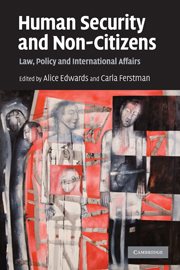Book contents
- Frontmatter
- Contents
- About the editors
- About the contributors
- Preface
- Acknowledgements
- Part I Human security, human rights and human dignity
- Part II Physical and legal security, armed conflict and refuge
- 2 The value of the human security framework in addressing statelessness
- 3 Protection and empowerment: strategies to strengthen refugees' human security
- 4 From here to where? Refugees living in protracted situations in Africa
- 5 Once we were warriors: critical reflections on refugee and IDP militarisation and human security
- 6 Human security and protection from refoulement in the maritime context
- Part III Migration, development and environment
- Part IV National security and the ‘war on terror’
- Index
5 - Once we were warriors: critical reflections on refugee and IDP militarisation and human security
Published online by Cambridge University Press: 17 February 2011
- Frontmatter
- Contents
- About the editors
- About the contributors
- Preface
- Acknowledgements
- Part I Human security, human rights and human dignity
- Part II Physical and legal security, armed conflict and refuge
- 2 The value of the human security framework in addressing statelessness
- 3 Protection and empowerment: strategies to strengthen refugees' human security
- 4 From here to where? Refugees living in protracted situations in Africa
- 5 Once we were warriors: critical reflections on refugee and IDP militarisation and human security
- 6 Human security and protection from refoulement in the maritime context
- Part III Migration, development and environment
- Part IV National security and the ‘war on terror’
- Index
Summary
Introduction
The presence of refugees and internally displaced persons (IDPs) are amongst the clearest expressions of a state's failure to protect its civilian population. Although a range of normative mechanisms were developed since the 1950s to guarantee the rights of those forced to cross international borders, many of these are not adequately enforced and no de jure protections were created for those unable or unwilling to flee their country of origin. And while a rights discourse is gradually emerging that calls attention to the specific categories of vulnerability of both refugees and IDPs, developed states are increasingly reluctant to grant asylum for the former or invest in sustained durable solutions such as return or resettlement for the latter.
Paradoxically, while the incidence of cross-border and internal displacement temporarily declined in the past decade, scholars and practitioners documented a steady increase in so-called ‘protracted’ refugee and IDP situations. The outward and inward militarisation of refugees and IDPs, and the potential for armed violence to spread across borders or into otherwise ‘peaceful’ areas, climbed up the agenda of humanitarian agencies, donors and hosting states. Conceptually, militarised camps reside at the intersection of more conventional ‘national security’ – security of the state and of territorial frontiers – and ‘human security’, which privileges the safety, dignity and protection of individuals. Practically, refugee and IDP militarisation constitutes a problem from hell.
- Type
- Chapter
- Information
- Human Security and Non-CitizensLaw, Policy and International Affairs, pp. 166 - 194Publisher: Cambridge University PressPrint publication year: 2010
- 2
- Cited by



